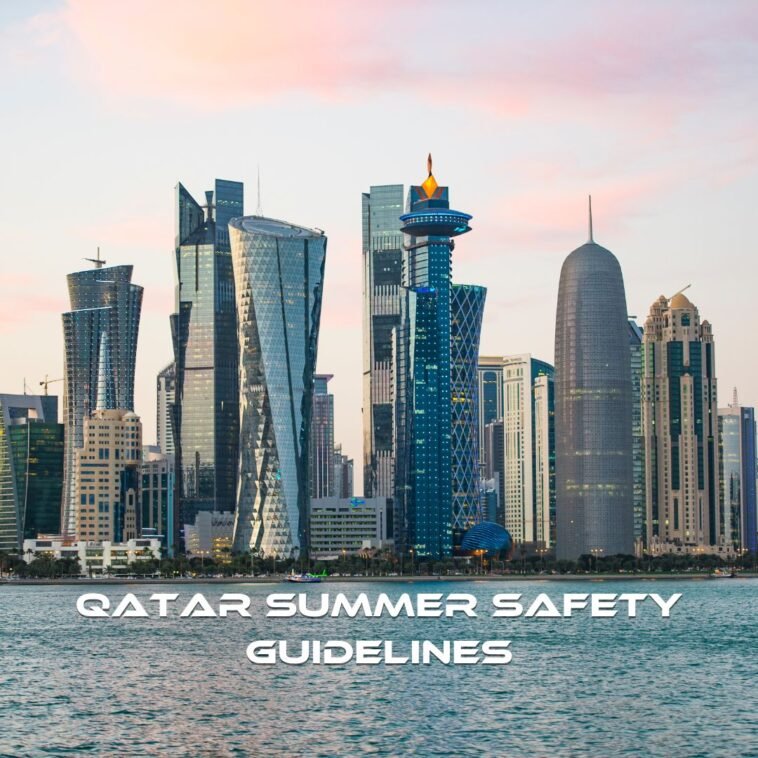The blazing sun, scorching temperatures, and relentless heatwaves characterize the summer season in Qatar. As the mercury rises, so do the risks associated with the extreme climate. It’s during these months that a heightened focus on safety becomes imperative to ensure the well-being of oneself and loved ones.
II. Understanding the Summer Climate in Qatar
Qatar’s summer climate is unforgiving, with temperatures soaring well above 40 degrees Celsius (104 degrees Fahrenheit). Coupled with high humidity levels, the heat index often makes it feel even hotter, posing significant health risks to residents and visitors alike.
The intense heat can lead to heat exhaustion, heatstroke, dehydration, and other heat-related illnesses if precautions are not taken. Outdoor activities must be approached with caution, and adequate measures should be in place to combat the formidable summer climate.
Stay tuned for the next section on “Preventing Accidents at Home,” where we delve into essential safety measures within your living space to mitigate risks during the scorching summer months in Qatar.
III. Preventing Accidents at Home
The sanctuary of our homes should be a safe haven, especially during the challenging summer months in Qatar. Here are some crucial safety measures to implement to prevent accidents and promote a secure living environment:
- Fire Safety: With the heat soaring, the risk of fires increases. Ensure that gas or electric-powered water heaters are turned off when not in use to prevent potential fire hazards. Regularly inspect and service appliances like air conditioners and electric chimneys to maintain their optimal functionality and reduce the risk of electrical fires.
- Electrical Safety: Keep an eye on electrical appliances, ensuring they are switched off when not in use to prevent any electrical mishaps. Dusting and maintaining exhaust fans regularly can also reduce the risk of electrical fires caused by overheating.
- Storage Safety: Store flammable substances away from direct sunlight and heat sources to avoid accidents. Properly storing items like lighters and batteries is essential to prevent potential hazards.
By implementing these measures and being vigilant about safety at home, you can significantly reduce the risk of accidents, ensuring a secure environment for yourself and your loved ones during the scorching summer season in Qatar.
IV. Vehicle Safety in the Summer
The summer heat in Qatar not only affects individuals but also takes a toll on vehicles. Ensuring your vehicle is in optimal condition during the scorching summer months is crucial for both your safety and the longevity of your vehicle. Here are some essential tips to keep your vehicle safe and functional in the heat:
- Regular Maintenance: Schedule regular maintenance checks for your vehicle, focusing on essential components like the cooling system, brakes, tires, and battery. The extreme heat can exacerbate existing issues, so proactive maintenance is key.
- Fluid Levels: Check the levels of essential fluids such as engine oil, coolant, and windshield washer fluid regularly. In the heat, these fluids evaporate more quickly, so ensure they are topped up to prevent overheating or other potential issues.
- Tire Care: The hot asphalt can cause tire pressure to increase, leading to blowouts. Monitor tire pressure frequently and maintain it at the recommended levels to ensure optimal traction and stability on the roads.
- Parking Considerations: When parking your vehicle, opt for shaded areas to minimize direct sunlight exposure. Consider using sunshades for your windshield and windows to reduce interior heat buildup.
- Emergency Kit: Keep an emergency kit in your vehicle, including items such as water, a first aid kit, a flashlight, jumper cables, and a reflective warning triangle. Be prepared for unforeseen circumstances on the road.
By following these tips and maintaining your vehicle diligently, you can ensure a safe and smooth driving experience during the scorching summer months in Qatar.
V. Water Safety and Supervision
In Qatar, where the summer heat can be relentless, water activities are a popular way to cool off and enjoy the outdoors. Whether at the beach, pool, or water park, it is crucial to prioritize water safety, especially when children are involved. Here are some essential guidelines for ensuring water safety and supervision during the hot summer months:
- Supervision: Supervision is paramount when it comes to water activities, especially for children. Designate a responsible adult to keep a close eye on swimmers at all times to prevent accidents and ensure prompt action in case of emergencies.
- Swimming Skills: Ensure that children and inexperienced swimmers have the necessary swimming skills or are equipped with appropriate flotation devices when in the water. Enrolling children in swimming lessons can significantly enhance their water safety and confidence.
- Pool Safety: If you have a pool at home, install barriers such as fences and self-locking gates to prevent unsupervised access. Keep pool toys and other objects away from the poolside to avoid tripping hazards.
- Beach Safety: When visiting the beach, swim in designated swimming areas monitored by lifeguards. Pay attention to warning flags and signs indicating water conditions and potential hazards.
- CPR Training: Knowing CPR can be lifesaving in water-related emergencies. Consider taking a CPR course to equip yourself with the skills needed to respond effectively in critical situations.
By following these water safety guidelines and prioritizing supervision, you can enjoy water activities while minimizing the risks associated with swimming in the intense summer heat of Qatar.
VI. Sun Protection and Skin Care
The intense summer sun in Qatar can pose significant risks to skin health, making sun protection a crucial aspect of summer safety. Here are some essential tips for protecting yourself and your loved ones from the harmful effects of UV radiation:
- Sunscreen: Use a broad-spectrum sunscreen with an SPF of 30 or higher and apply it generously to all exposed skin at least 15 minutes before going outdoors. Reapply sunscreen every two hours or more frequently if swimming or sweating.
- Protective Clothing: Wear lightweight, loose-fitting clothing that covers as much skin as possible. Wide-brimmed hats, sunglasses with UV protection, and umbrellas can provide additional protection from the sun’s rays.
- Seek Shade: Limit exposure to direct sunlight, especially during peak hours between 10 a.m. and 4 p.m. Seek shade under trees, umbrellas, or canopies to reduce UV exposure.
- Hydration: Stay hydrated by drinking plenty of water throughout the day, especially in the heat. Proper hydration not only supports overall health but also helps maintain skin moisture and resilience.
- Heat-Related Illnesses: Be aware of the signs of heat-related illnesses such as heat exhaustion and heatstroke. Symptoms include excessive sweating, dizziness, nausea, and rapid heartbeat. If you or someone you know exhibits these symptoms, seek immediate medical attention.
By incorporating these sun protection and skin care practices into your daily routine, you can enjoy the summer season in Qatar while safeguarding your skin health and reducing the risk of sunburn and long-term skin damage.
VII. Electricity Consumption and Energy Saving
As temperatures soar in Qatar during the summer months, the demand for electricity for cooling and other purposes increases significantly. Implementing energy-saving strategies not only helps reduce your utility bills but also contributes to environmental sustainability. Here are some tips for minimizing electricity consumption and promoting energy efficiency:
- Optimize Air Conditioning: Set your air conditioner to an efficient temperature (around 24-26 degrees Celsius) to balance comfort and energy savings. Use ceiling fans to circulate cool air and reduce the workload on your AC unit.
- Seal Air Leaks: Inspect doors, windows, and other openings for air leaks that can allow cool air to escape. Seal any gaps with weather stripping or caulking to improve energy efficiency.
- Use Energy-Efficient Appliances: Upgrade to energy-efficient appliances with high Energy Star ratings. These appliances consume less energy, reducing your overall electricity usage.
- Natural Ventilation: Take advantage of natural ventilation during cooler times of the day by opening windows and allowing cross ventilation to cool your home without relying solely on air conditioning.
- Unplug Electronics: Unplug electronics and chargers when not in use to avoid phantom energy consumption. Use power strips to easily turn off multiple devices at once.
- Energy-Saving Lighting: Switch to energy-efficient LED bulbs that consume less energy and last longer than traditional incandescent bulbs. Make use of natural light during the day to reduce reliance on artificial lighting.
By adopting these energy-saving practices and being mindful of your electricity consumption, you can not only lower your energy bills but also contribute to a more sustainable and environmentally friendly lifestyle in Qatar.
VIII. Emergency Preparedness and Essential Contacts
Being prepared for emergencies is essential, especially during the summer months when extreme heat and weather conditions can pose risks to safety and well-being. Here are key steps to enhance your emergency preparedness in Qatar:
- Create an Emergency Plan: Develop a comprehensive emergency plan for your household, including evacuation procedures, emergency contacts, and essential supplies such as food, water, and medical supplies.
- Stay Informed: Stay updated on weather forecasts, advisories, and emergency alerts issued by local authorities. Being aware of potential hazards can help you respond effectively in case of emergencies.
- Emergency Contacts: Keep a list of essential emergency contacts handy, including local emergency services (police, fire department, ambulance), utility providers, hospitals, and relevant government agencies.
- First Aid Kit: Maintain a well-stocked first aid kit at home and in your vehicle. Include basic supplies such as bandages, antiseptic wipes, medications, and emergency contact information.
- Communication Plan: Establish a communication plan with family members or close contacts in case of separation during an emergency. Determine a central point of contact and ensure everyone knows how to reach each other.
- Know Your Location: Familiarize yourself with your surroundings, including nearby emergency shelters, evacuation routes, and community resources that can provide assistance during emergencies.
By proactively preparing for emergencies and having essential contacts readily available, you can better protect yourself and your loved ones during unforeseen events that may arise during the summer season in Qatar.
IX. Emergency Helpline Numbers:
- Ambulance/Fire/Accident: 999 Emergency and Trauma Centers:
- Hamad Hospital: +974 4439 5777
- Al Wakra Hospital (Adults): +974 4011 4314
- Al Wakra Hospital (Children): +974 4011 4636 / +974 4011 4637 / +974 4011 4638
- Women’s Hospital: +974 4439 3296
- Heart Hospital: +974 4439 5474 / +974 4439 5475
- Al Khor Hospital: +974 4474 5654
- HMC Hotline Advisory (Child Health): +974 4439 6066 Roadside Assistance:
- AA Roadside Assistance: +974 3003 1241
- Qatar Towing Service: +974 6602 6862 / +974 5088 4428
X. Summary and Key Takeaways
As you navigate the scorching summer months in Qatar, prioritizing safety and well-being is paramount. Here are the key takeaways from the essential safety guidelines discussed:
- Home Safety: Implement fire safety measures, maintain electrical appliances, and store flammable substances securely to prevent accidents at home.
- Vehicle Safety: Regularly maintain your vehicle, monitor fluid levels and tire pressure, park in shaded areas, and keep an emergency kit in your vehicle for safe travels.
- Water Safety: Supervise water activities, ensure swimming skills or flotation devices for children, and be aware of pool and beach safety guidelines to prevent accidents.
- Sun Protection: Use sunscreen, wear protective clothing, seek shade, stay hydrated, and be aware of heat-related illnesses to safeguard your skin health in the intense sun.
- Energy Saving: Optimize air conditioning, seal air leaks, use energy-efficient appliances, natural ventilation, and energy-saving lighting to reduce electricity consumption and promote sustainability.
- Emergency Preparedness: Create an emergency plan, stay informed, maintain emergency contacts, have a first aid kit, establish a communication plan, and know your location for effective response during emergencies.
By incorporating these safety guidelines into your daily routine and being prepared for potential risks, you can enjoy a safe, healthy, and enjoyable summer in Qatar for yourself and your loved ones.
Stay safe and enjoy the summer season responsibly!
Please Subscribe Us to get updated with Qatar News, Saudi News, Kuwait News, Health News, UAE News, Iqama, Visa, Jobs, Banking and More



